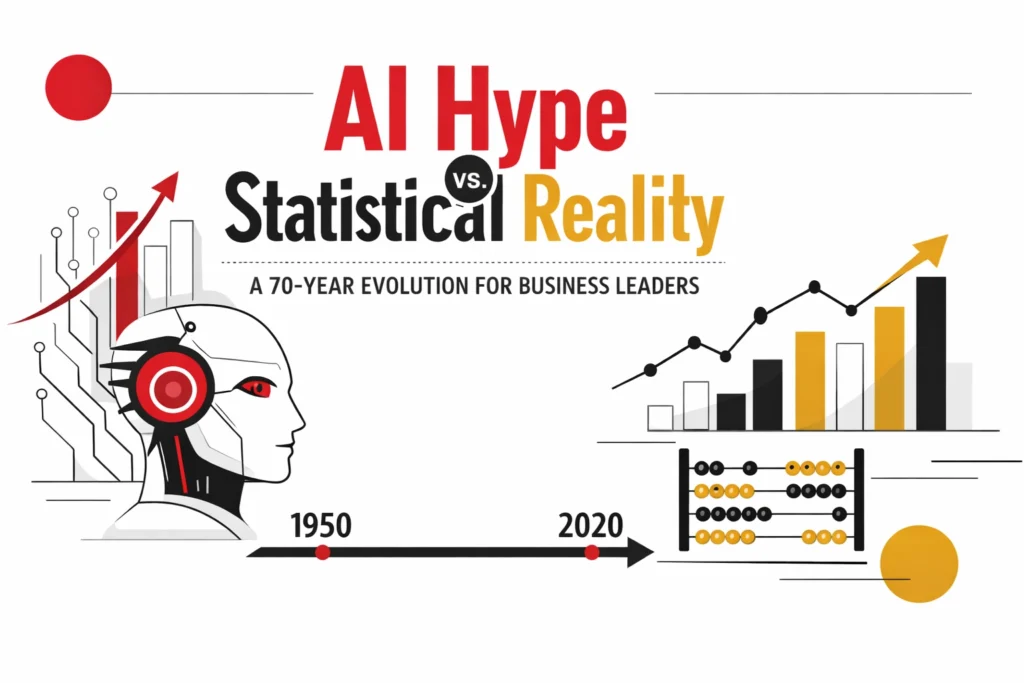In today’s data-driven business landscape, statistics serves as the cornerstone of understanding and interpreting the vast amounts of information generated by organizations. From econometrics to machine learning and artificial intelligence (AI), statistics forms the primary building block that enables businesses to make informed decisions, uncover actionable insights, and drive innovation. In this blog, we’ll explore the critical role of statistics in business applications, its significance in fields such as econometrics, machine learning, and AI, and why learning statistics is essential for success in today’s competitive environment.
Understanding the Role of Statistics in Business Applications
Statistics is the science of collecting, analyzing, interpreting, and presenting data. In the context of business applications, statistics enables organizations to derive meaningful insights from data, quantify uncertainty, and make informed decisions based on evidence rather than intuition or guesswork. Whether it’s measuring performance, identifying trends, or predicting future outcomes, statistics provides a rigorous framework for understanding and leveraging data to drive business success.
Statistics as the Foundation of Econometrics
Econometrics, the application of statistical methods to economic & business data, relies heavily on statistical principles to model and analyze economic phenomena. By applying statistical techniques such as regression analysis, hypothesis testing, and time series analysis, econometricians can assess the relationships between economic variables, test economic theories, and make forecasts about future economic trends. Statistics provides the necessary tools and methodologies for econometricians to draw meaningful conclusions from economic data and inform policy decisions, investment strategies, and business planning.
Statistics Empowering Machine Learning and AI
In the realm of machine learning and artificial intelligence, statistics plays a pivotal role in developing predictive models, training algorithms, and evaluating performance. Machine learning algorithms, which learn from data to make predictions or decisions, are grounded in statistical principles such as probability theory, estimation, and hypothesis testing. Statistics enables data scientists and machine learning engineers to assess the accuracy and reliability of predictive models, identify patterns and trends in data, and make informed decisions about model selection and optimization. In AI applications such as natural language processing, computer vision, and recommendation systems, statistics provides the mathematical foundation for understanding and manipulating large volumes of data to extract meaningful insights and drive intelligent decision-making.
Applications of Statistics in Business
- Performance Measurement: Statistics enables businesses to quantify and measure various aspects of performance, including sales growth, profitability, customer satisfaction, and employee productivity. By analyzing performance metrics using statistical techniques such as hypothesis testing and regression analysis, businesses can identify areas for improvement, set realistic goals, and track progress over time.
- Market Research and Consumer Behavior Analysis: Statistics plays a crucial role in market research and consumer behavior analysis, allowing businesses to gather, analyze, and interpret data on market trends, consumer preferences, and purchasing behavior. Statistical techniques such as sampling, survey design, and data analysis enable businesses to extract actionable insights from market data, identify target audiences, and develop effective marketing strategies and campaigns.
- Risk Management and Decision-Making: In risk management and decision-making, statistics provides a framework for assessing and quantifying uncertainty, analyzing probabilities, and making informed choices in the face of uncertainty. By employing statistical methods such as probability distributions, risk assessment models, and decision analysis, businesses can evaluate potential risks, weigh alternative courses of action, and make strategic decisions that maximize value and minimize risk.
Why Learning Statistics is Essential
- Data-Driven Decision-Making: Statistics equips business professionals with the skills and knowledge needed to analyze data, extract insights, and make evidence-based decisions that drive business success.
- Critical Thinking and Problem-Solving: Learning statistics fosters critical thinking skills and analytical reasoning, enabling individuals to approach complex problems systematically, formulate hypotheses, and evaluate evidence objectively.
- Competitive Advantage: In today’s data-driven business environment, organizations that leverage statistics effectively gain a competitive advantage by making better-informed decisions, optimizing performance, and capitalizing on emerging opportunities.
- Cross-Disciplinary Applications: Statistics has broad applications across various disciplines, including business, economics, healthcare, social sciences, and engineering, making it a versatile and valuable skillset for professionals in diverse fields.
In conclusion, statistics serves as the foundation of data-driven decision-making in business applications, providing the essential tools and methodologies for analyzing data, making predictions, and informing strategic decisions. Whether in econometrics, machine learning, AI, or other areas of business analytics, statistics empowers organizations to extract meaningful insights from data, gain a competitive edge, and drive innovation in today’s dynamic and competitive business landscape. Learning statistics is not only important but essential for professionals seeking to succeed in the data-driven economy of the 21st century.







